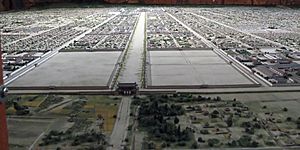Daigaku-ryō facts for kids

The Daigaku-ryō (error: {{nihongo}}: Japanese or romaji text required (help)) was a very important school in ancient Japan. It was like the main university for the country. This school taught young people who would later work for the government. It existed for a very long time, from the 600s until the late 1800s. For about 500 years, the Daigaku-ryō was located near a big gate called Suzaku Mon. This gate was at the southern edge of the Emperor's palace area.
History of the Daigaku-ryō
The Daigaku-ryō became an official part of the government in the year 701. It was placed under the Ministry of the Civil Services (式部省,, Shikibu-shō). This ministry was in charge of government workers and their training.
A famous person named Prince Yamabe was once in charge of the Daigaku-ryō. This happened in the year 766. Prince Yamabe later became Emperor Kammu. He was a very important emperor in Japanese history.
Sadly, a big fire destroyed the Daigaku-ryō building. This happened on May 27, 1177. After this, the school faced many challenges.
How the Daigaku-ryō Was Organized
The Daigaku-ryō had many important teachers and staff. The main leader was called the director (大学頭, Daigaku-no-kami). This person had big responsibilities. They were in charge of testing students. They also led special events that honored Confucius. Confucius was a famous Chinese thinker whose ideas were very important in Japan.
Other important staff members at the Daigaku-ryō included:
- Chief experts on history (紀伝博士,, Kiden hakase): These teachers knew a lot about the history of both Japan and China.
- Chief experts on classic Chinese writings (明経博士,, Myōgyō hakase): These teachers taught about old and important Chinese books.
- Chief experts on laws (明法博士,, Myōbō hakase): These teachers taught students about the laws of Japan and China.
- Chief experts on math (算博士,, San hakase): These teachers taught mathematics.
- Instructors of literature (直講,, Chok'kō): There were two teachers who taught Japanese and Chinese literature.
- Instructors in pronunciation (音博士,, On hakase): Two teachers helped students learn how to pronounce words correctly.
- Instructors in calligraphy (書博士,, Sho hakase): Two teachers taught the art of beautiful writing, known as calligraphy.
 | Claudette Colvin |
 | Myrlie Evers-Williams |
 | Alberta Odell Jones |

